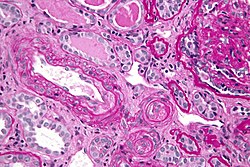Hypertension
Hypertension, also high blood pressure, is very common and affects multiple organs. Clinically, it is usually classified as primary (idiopathic) and secondary.

Hypertensive crisis, if untreated, is associated with damage to the brain, heart, eye and kidneys.[1]
Pulmonary hypertension is dealt with separately in the article pulmonary hypertension.
Classification
It is classified by etiology.
Primary
- Idiopathic.
- Most common.
Secondary
Renovascular:
- Fibromuscular dysplasia of the renal artery
- Atherosclerosis of the renal artery.
- Compression of renal artery by a tumour.
Endocrine related - tumours:
- Juxtaglomerular cell tumour - produces renin.
- Pheochromocytoma.
- Renal cell carcinoma.
- Adrenal cortical adenoma (aldosterone producing) - Conn syndrome.
- Adrenal cortical carcinoma (aldosterone producing).
- Wilms tumour.
Other endocrine:
- Hyperthyroidism.
Other:
- Renal failure.
- Scleroderma.
- Sleep apnea.
- Drugs - notably alcohol.
Brain
Charcôt-Bouchard aneurysms
General
- AKA miliary aneurysms and microaneurysm.[2]
- Associated with Intracerebral hemorrhages.
- Classically found in the basal ganglia or the pons.[3]
Microscopic
Features:[4]
- Small aneurysms (~300 micrometers) with a fusiform shape.
- Vessel wall changes:
- Early:
- Proliferation of arteriolar smooth muscle
- Late:
- Apoptotic smooth muscle cell death and collagen deposition.
- Early:
Image: C-B aneurysm (ucsf.edu).[5]
Intracerebral hematoma
Most common sites:[6]
- Subcortex.
- Putamen.
- Pons.
- Thalamus.
- Cerebellum.
Notes:
- Memory device:
- Ps and the major structures behind 'em: putamen + thalamus, pons + cerebellum.
- Two papers[7][8] say putamen is #1 and thalamus is #2.
Lacunar infarcts
General
- Common.
- May be located in the putamen.[9]
Hypertension and the eye[10]
- Hypertensive retinopathy.
- Aneurysms.
- Branch retinal vein occlusion (BRVO).
- Vitreous hemorrhage.
Hypertensive heart disease
General
- Treated with antihypertensives.
- Mechanism of death: (ventricular) arrhythmia.[11]
Associated pathology[11]
- Left atrial enlargement and atrial fibrillation.
Gross
Features:[12]
- Left ventricular hypertrophy (concentric).
Notes:
- In the autopsy context, significant valvular heart disease should be absent.
- A heart > ~400 g is considered good enough for the cause of death hypertensive heart disease, if no other significant findings are present.[13]
- Right ventricular hypertrophy is commonly seen.[14][15]
Gross DDx:
Microscopic
Features:[12]
Kidney
General
- May result in renal failure.
- Hypertension in the kidney may be:
- Primary, i.e. seen in isolation.
- Secondary, i.e. it arises due to another kidney disease.
Gross
- Granular appearance of the surface.
Note:
- Normal kidneys have a smooth surface.
Image:
Microscopic
Features:[17]
- Fibrinoid necrosis of afferent and interlobular arteries (due to endothelial cell damage).
Malignant hypertension - characterized by:[18]
- Hyperplastic arteriolosclerosis - onion skin-like appearance of intima & media with luminal narrowing (chronic change).
Note:
- Diabetes mellitus has changes in the afferent and efferent arteriole (see medical kidney diseases).
Malignant hypertension
General
- A medical emergency.
Defined as either of the following:[19][20]
- >220 mmHg systolic BP.
- >120 mmHg diastolic BP.
Prognosis:
- Depends on the acute rise in blood pressure.[19]
- Adverse outcomes may arise even when the BP is not at the levels given above.
- Usually better than with HUS.[21]
Microscopic
Features:
Histomorphologic DDx (thrombotic microangiopathy):
- HUS.
- TTP.
- DIC.
- Scleroderma renal crisis.
- ALPA syndrome.
- Drug reaction, e.g. calcineurin inhibitors.
See also
References
- ↑ Janota T (2009). "[Hypertensive crisis--the present view]" (in Czech). Cas. Lek. Cesk. 148 (8): 370–3. PMID 19899722.
- ↑ Kojima H, Eguchi H, Mizutani T, Tanaka K, Kikuchi Y, Fukudome N (2007). "Three-dimensional analysis of pathological characteristics of a microaneurysm". Clin. Neuropathol. 26 (2): 74–9. PMID 17416106.
- ↑ URL: http://missinglink.ucsf.edu/lm/introductionneuropathology/Response%20_to_Injury/Microvascular.html. Accessed on: 24 September 2010.
- ↑ Auer RN, Sutherland GR (December 2005). "Primary intracerebral hemorrhage: pathophysiology". Can J Neurol Sci 32 Suppl 2: S3–12. PMID 16450803.
- ↑ URL: http://missinglink.ucsf.edu/lm/introductionneuropathology/Response%20_to_Injury/Microvascular.html. Accessed on: 26 November 2010.
- ↑ Tanaka A, Ueno Y, Nakayama Y, Takano K, Takebayashi S (August 1999). "Small chronic hemorrhages and ischemic lesions in association with spontaneous intracerebral hematomas". Stroke 30 (8): 1637–42. PMID 10436114.
- ↑ Hung TP, Chen ST (December 1993). "[Cerebral hemorrhage in Taiwan]" (in Chinese). J. Formos. Med. Assoc. 92 Suppl 4: S161–8. PMID 7910073.
- ↑ Weisberg LA (September 1990). "How to identify and manage brain hemorrhage". Postgrad Med 88 (3): 169–75. PMID 2204896.
- ↑ URL: http://moon.ouhsc.edu/kfung/jty1/neurotest/Q04-Ans.htm. Accessed on: 26 October 2010.
- ↑ URL: http://health.indiamart.com/eye-care/hypertension-and-eye.html. Accessed on: 23 September 2010.
- ↑ 11.0 11.1 Prisant LM (April 2005). "Hypertensive heart disease". J Clin Hypertens (Greenwich) 7 (4): 231–8. PMID 15860963.
- ↑ 12.0 12.1 Schwartzkopff B, Strauer BE (2000). "Coronary reserve and arteriolosclerosis in hypertensive heart disease". Z Kardiol 89 Suppl 9: IX/132–5. PMID 11151783.
- ↑ MSP. 29 September 2010.
- ↑ Sant'Anna, MP.; Mello, RJ.; Montenegro, LT.; Araújo, MM.. "[Left and right ventricular hypertrophy at autopsy of hypertensive individuals].". Rev Assoc Med Bras 58 (1): 41-7. PMID 22392315.
- ↑ Cuspidi, C.; Valerio, C.; Sala, C.; Negri, F.; Esposito, A.; Masaidi, M.; Giudici, V.; Zanchetti, A. et al. (Mar 2009). "Metabolic syndrome and biventricular hypertrophy in essential hypertension.". J Hum Hypertens 23 (3): 168-75. doi:10.1038/jhh.2008.119. PMID 18800141.
- ↑ 16.0 16.1 Koda, M.; Takemura, G.; Okada, H.; Kanoh, M.; Maruyama, R.; Esaki, M.; Li, Y.; Miyata, S. et al. (Jun 2006). "Nuclear hypertrophy reflects increased biosynthetic activities in myocytes of human hypertrophic hearts.". Circ J 70 (6): 710-8. PMID 16723792.
- ↑ Ono H, Ono Y (November 1997). "Nephrosclerosis and hypertension". Med. Clin. North Am. 81 (6): 1273–88. PMID 9356598.
- ↑ Klatt, Edward C. (2006). Robbins and Cotran Atlas of Pathology (1st ed.). Saunders. pp. 7. ISBN 978-1416002741.
- ↑ 19.0 19.1 Gegenhuber, A.; Lenz, K. (Dec 2003). "[Hypertensive emergency and urgence].". Herz 28 (8): 717-24. doi:10.1007/s00059-003-2506-8. PMID 14689106.
- ↑ Lenz, K. (Apr 2004). "[Treating a hypertensive emergency].". MMW Fortschr Med 146 (15): 42, 44, 46-8. PMID 15373020.
- ↑ Zhang, B.; Xing, C.; Yu, X.; Sun, B.; Zhao, X.; Qian, J. (Mar 2008). "Renal thrombotic microangiopathies induced by severe hypertension.". Hypertens Res 31 (3): 479-83. doi:10.1291/hypres.31.479. PMID 18497467.